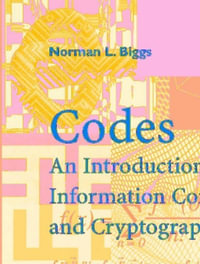
Smooth-Automorphic Forms and Smooth-Automorphic Representations
By: Harald Grobner
eBook | 9 July 2023
At a Glance
ePUB
eBook
RRP $59.31
$53.99
or 4 interest-free payments of $13.50 with
orInstant Digital Delivery to your Kobo Reader App
This book provides a conceptual introduction into the representation theory of local and global groups, with final emphasis on automorphic representations of reductive groups G over number fields F.
Our approach to automorphic representations differs from the usual literature: We do not consider 'K-finite' automorphic forms, but we allow a richer class of smooth functions of uniform moderate growth. Contrasting the usual approach, our space of 'smooth-automorphic forms' is intrinsic to the group scheme G/F.
This setup also covers the advantage that a perfect representation-theoretical symmetry between the archimedean and non-archimedean places of the number field F is regained, by making the bigger space of smooth-automorphic forms into a proper, continuous representation of the full group of adelic points of G.
Graduate students and researchers will find the covered topics appear for the first time in a book, where the theory of smooth-automorphic representations is robustly developed and presented in great detail.
Contents:
-
Local Groups:
- Basic Notions and Concepts from Functional Analysis ('Local')
- Representations of Local Groups — The Very Basics
- Langlands Classification: Step 1 — What to Classify?
- Langlands Classification: Step 2
- Langlands Classification: Step 3
- Special Representations: Part 1
- Special Representations: Part 2
-
Global Groups:
- Basic Notions and Concepts from Functional Analysis ('Global')
- First Adelic Steps
- Representations of Global Groups — The Very Basics
- Automorphic Forms and Smooth-Automorphic Forms
- Automorphic Representations and Smooth-Automorphic
- Cuspidality and Square-integrability
- Parabolic Support
- Cuspidal Support
Readership: PhD students and researchers in the fields of automorphic forms, representation theory of local groups (archimedean and non-archimedean) and, more generally, the Langlands Program.
Key Features:
- Our approach to local as well as to global representation theories are new and cannot be found, yet, in this form in a textbook
on
ISBN: 9789811246180
ISBN-10: 9811246181
Series: Series on Number Theory and Its Applications : Book 17
Published: 9th July 2023
Format: ePUB
Language: English
Publisher: World Scientific Publishing Company
Volume Number: 17
You Can Find This eBook In

eBOOK
A Beginner's Guide to Constructing the Universe
The Mathematical Archetypes of Nature, Art, and Science
eBook
RRP $35.99
$28.99
OFF

eTEXT
$118.80

eBOOK
eBook
$5.99

eBOOK
RRP $16.49
$15.99

eBOOK
The Last VincS-Collatz' Conjecture and Theorem - ENG - (ITA)- 202504200229CEST
The Kiss Theorems King
eBook
RRP $85.78
$68.99
OFF

eTEXT
$141.89

eBOOK
RRP $39.60
$31.99
OFF

eBOOK
RRP $216.70
$173.99
OFF

eBOOK
$154.99

eBOOK
RRP $174.90
$139.99
OFF














